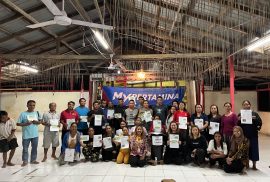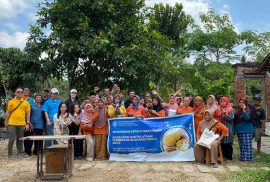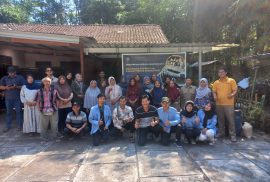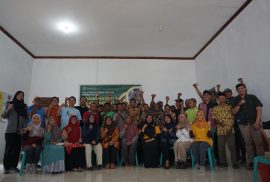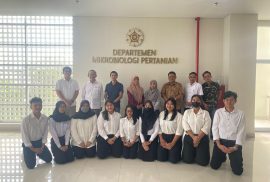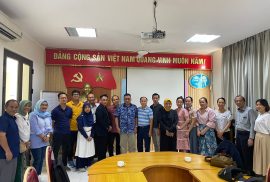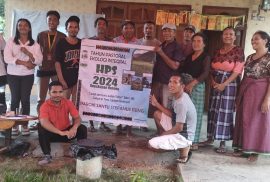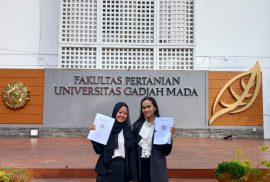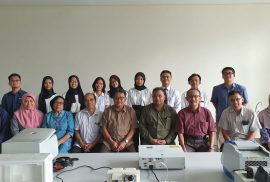One of the Agricultural Microbiology students from the 2021 cohort, Erina Tika Febiyanti, who is commonly known as Erina, has just completed her Community Service-Learning and Community Empowerment Program (KKN-PPM) for the second period of 2024 in Dusun Badat Lama, Suruh Tembawang Village, Entikong Sub-district, Sanggau Regency, West Kalimantan. This KKN activity is a mandatory course that provides students with the opportunity to directly apply their field of study to help solve problems that arise in the community. According to Erina, the KKN program encourages students to broaden their perspectives, engage dynamically with the community to observe existing challenges, and solve those challenges by empowering local residents. Erina believes that the 50-day period for the community service program is not enough to fully resolve all the existing issues, but it is sufficient to initiate positive change, both for herself as a student and for the community to become more empowered in improving their well-being.
SDG 1: TANPA KEMISKINAN
On Sunday, August 25, 2024, a team of lecturers and students from the Department of Agricultural Microbiology, Faculty of Agriculture, UGM carried out community service activities with a farmer group in Kalibawang District, Kulon Progo Regency, DIY. The socialization and training on small-scale cocoa bean fermentation were attended by 47 participants from cocoa farmer groups, women’s organizations (PKK), representatives of youth groups, and summer course students from Ibaraki University, Faculty of Agriculture. The Agricultural Microbiology lecturer who served as the resource person for the cocoa fermentation training was Nur Akbar Arofatullah, SP., M.Biotech., Ph.D., who taught the participants about small-scale cocoa bean fermentation.
On Monday, August 5, 2024, the Faculty of Agriculture’s Microbiology Department lecturers from Universitas Gadjah Mada, along with several agricultural microbiology students, conducted a training on the production of fermented livestock feed “Silage” in Umbulharjo village, Cangkringan District, Sleman Regency, Yogyakarta, as an effort to improve livestock efficiency and health. The Silage production training was held at one of the villagers’ houses and was attended by approximately 30 participants, including the local neighborhood head and residents who own livestock.
Saturday, July 20, 2024, the Faculty of Agriculture lecturers and students from Universitas Gadjah Mada carried out community service in Koripan Village, Matesih, Karanganyar, Central Java. A training on the production and utilization of biochar and silage was held at the Koripan Hamlet meeting hall, attended by approximately 40 participants, including the head of Matesih sub-district, Sugiharjo, SIP., MM., the head of the agricultural extension center of Matesih sub-district, the head of Koripan Hamlet RT, and resource persons for silage and biochar production training.
The Agricultural Microbiology Department graduated nine students consisting of four students from the 2017 cohort, three students from the 2019 cohort, and two students from the 2020 cohort. The Agricultural Microbiology Study Program graduation ceremony was held in the Microbial Ecology Laboratory Room, Agrotropica Learning Center (AGLC) 4th Floor on Monday, July 22, 2024, attended by the Head of the Study Program, the Head of the Department, and the Thesis Supervisors. The graduation ceremony began with a speech by Prof. Ir. Irfan Dwidya Prijambada, M.Eng., Ph.D.
The Department of Agricultural Microbiology, Faculty of Agriculture, UGM conducted a comparative study to Hanoi University of Science and Technology (HUST) and Plant Medicinal Research Centre (PMRC) in Vietnam. This activity aimed to establish cooperation with both institutions in Vietnam, promote the reputation of Gadjah Mada University as a global player in education, research, and community service, gain insights into curriculum development in the field of Agricultural Microbiology, and map potential programs that can be continued as collaborations between the university and related institutions. This comparative study was conducted from July 15-16, 2024, with activities including a visit to Hanoi University of Sciences and Technology (HUST) on Monday, July 15, 2024, with discussion topics on the potential collaboration between UGM and HUST. It continued on Tuesday, July 16, 2024, with a visit to the Plant Medicinal Research Center (PMRC) with the topic of potential collaboration between UGM and PMRC.
On Tuesday, April 23, 2024, the Department of Agricultural Microbiology held a graduation ceremony (judicium), with a total of five students graduating at the Microbiology Library, AGLC Building, 4th floor. These five students will attend the graduation ceremony in May 2024. Three students under the research guidance of Ir. Ngadiman, M.Si., Ph.D., are conducting research on the relationship between beneficial microorganisms and the growth of food crops and pathogen control. One student under the research guidance of Prof. Ir. Triwibowo Yuwono, Ph.D., is researching the formulation of osmotolerant rhizobacteria as biofertilizer, and one student under the research guidance of Prof. Ir. Irfan Dwidya Prijambada, M.Eng., Ph.D., is researching gold biooxidation by Chromobacterium violaceum. Three out of the five students successfully graduated with honors (Cumlaude) with a GPA above 3.70.
One of the Microbiology students from the 2020 cohort, Uways Irfany, commonly known as Uways, has just completed the Community Empowerment Learning Work Lecture (KKN-PPM) period IV of the year 2023/2024 in Paka Village, Satar Mese District, Manggarai Regency, East Nusa Tenggara. This KKN activity is one of the compulsory courses that provide opportunities for students to directly apply their discipline in helping to address community issues. According to Uways, the KKN program encourages students to step out of their comfort zone, observe the challenges faced by the community, and contribute effectively to solving these challenges together with students from other disciplines as well as with the local community. Although the 50-day service period may seem very short, Uways believes it is enough to initiate positive change not only for himself as a student but also for the community to become more empowered.
In the Judiciary Events of periods 1 and 2 in January 2024, the Department of Agricultural Microbiology graduated two students with the fastest study period, namely Roihana Ifa Kamalia (2020), commonly known as Ifa, with a study duration of 3 years 4 months 9 days, and Daniella Atteke Cantika Putri, commonly known as Cantika, with a study duration of 3 years 4 months 17 days. Ifa and Cantika started their microbiology studies during the COVID-19 pandemic with fully online lectures until the third semester. According to them, the strategy they applied to complete their studies on time was setting academic targets, especially for Field Work, Seminars, and Theses, along with strict time discipline. They always documented their academic targets, such as starting to draft fieldwork proposals during the 4th semester break so that they could conduct Field Work during the 5th-semester break in January 2023. They also conducted their fieldwork simultaneously with writing the final reports, allowing them to present their Field Work Seminar in March 2023.
On January 23, 2024, the Department of Agricultural Microbiology held the January Judiciary Event for the 1st Period of the Academic Year of the Odd Semester 2023/2024 for seven students at the Soil and Environment Laboratory of the Agrotropica Learning Center (AGLC). The seven students, are Haedar Alfi Yahya (2018), Himatul Aliyah (2018), Alinda Ratna Rahmwati (2019), Muhammad Fadhil Muzaki (2019), Qurata A’yun Dyah Palupi (2019), Natalia Puspitasari (2019), and Roihana Ifa Kamalia (2020). Five students graduated with honors (Cumlaude) and two students graduated with distinction (Excellent). These seven students will participate in the graduation ceremony in February 2024 at Grha Sabha Pramana. One of the students who graduated with honors, Roihana Ifa Kamalia, completed her studies in the shortest time, which is 3 years, 4 months, and 9 days. Furthermore, on January 31, 2024, the Department of Agricultural Microbiology held another Judiciary Event for the 2nd period, graduating two students, Mutiara Diesta (2019) and Daniella Atteke Cantika Putri (2020). Both students also graduated with honors (Cumlaude), with Daniella Atteke Cantika Putri finishing in 3 years, 4 months, and 17 days. The graduating students conducted research on the utilization of microbes in plants and the environment to support sustainable agriculture.

